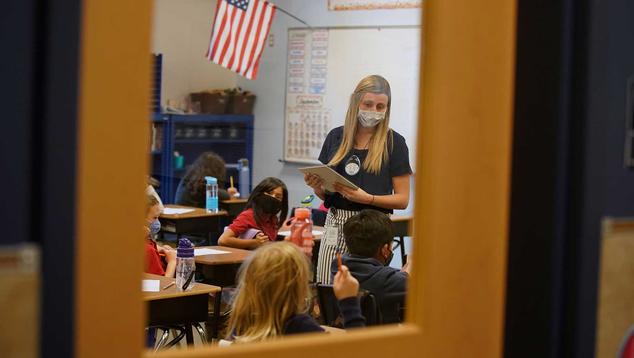Story Highlights
- 79% of parents of K-12 children support in-person schooling
- Republicans and working parents more supportive than counterparts
- 13% of parents cut back hours, 7% quit jobs to help with at-home learning
WASHINGTON, D.C. -- Nearly one year into the pandemic, an estimated one in three K-12 students in the U.S. do not currently have any options for in-person schooling. Many frustrated parents have been vocally pushing for a return to the classroom, citing concerns about the damage to their children's academic progress, psychological health and social development, and Gallup's latest data find 79% of parents of K-12 students in the U.S. favor in-person learning in their communities right now.
Although majorities of parents across major demographic subgroups are supportive of in-school learning for elementary and secondary school students, some are particularly so. Among them are working parents (82%), those living in the Northeast region of the U.S. (90%) and those who identify as Republicans (94%).
| Yes, support | No, do not support | |||||||||||||||||||||||||||||||||||||||||||||||||||||||||||||||||||||||||||||||||||||||||||||||||||
|---|---|---|---|---|---|---|---|---|---|---|---|---|---|---|---|---|---|---|---|---|---|---|---|---|---|---|---|---|---|---|---|---|---|---|---|---|---|---|---|---|---|---|---|---|---|---|---|---|---|---|---|---|---|---|---|---|---|---|---|---|---|---|---|---|---|---|---|---|---|---|---|---|---|---|---|---|---|---|---|---|---|---|---|---|---|---|---|---|---|---|---|---|---|---|---|---|---|---|---|---|
| % | % | |||||||||||||||||||||||||||||||||||||||||||||||||||||||||||||||||||||||||||||||||||||||||||||||||||
| All K-12 parents | 79 | 21 | ||||||||||||||||||||||||||||||||||||||||||||||||||||||||||||||||||||||||||||||||||||||||||||||||||
| Employment status | ||||||||||||||||||||||||||||||||||||||||||||||||||||||||||||||||||||||||||||||||||||||||||||||||||||
| Working | 82 | 18 | ||||||||||||||||||||||||||||||||||||||||||||||||||||||||||||||||||||||||||||||||||||||||||||||||||
| Not working | 71 | 29 | ||||||||||||||||||||||||||||||||||||||||||||||||||||||||||||||||||||||||||||||||||||||||||||||||||
| Party identification | ||||||||||||||||||||||||||||||||||||||||||||||||||||||||||||||||||||||||||||||||||||||||||||||||||||
| Republican | 94 | 6 | ||||||||||||||||||||||||||||||||||||||||||||||||||||||||||||||||||||||||||||||||||||||||||||||||||
| Independent | 80 | 20 | ||||||||||||||||||||||||||||||||||||||||||||||||||||||||||||||||||||||||||||||||||||||||||||||||||
| Democrat | 62 | 38 | ||||||||||||||||||||||||||||||||||||||||||||||||||||||||||||||||||||||||||||||||||||||||||||||||||
| U.S. region | ||||||||||||||||||||||||||||||||||||||||||||||||||||||||||||||||||||||||||||||||||||||||||||||||||||
| Northeast | 90 | 10 | ||||||||||||||||||||||||||||||||||||||||||||||||||||||||||||||||||||||||||||||||||||||||||||||||||
| Midwest | 83 | 17 | ||||||||||||||||||||||||||||||||||||||||||||||||||||||||||||||||||||||||||||||||||||||||||||||||||
| South | 78 | 22 | ||||||||||||||||||||||||||||||||||||||||||||||||||||||||||||||||||||||||||||||||||||||||||||||||||
| West | 72 | 28 | ||||||||||||||||||||||||||||||||||||||||||||||||||||||||||||||||||||||||||||||||||||||||||||||||||
| gallup panel, feb. 14-21, 2021 | ||||||||||||||||||||||||||||||||||||||||||||||||||||||||||||||||||||||||||||||||||||||||||||||||||||
These findings are from Gallup's Feb. 14-21 COVID-19 probability-based web panel survey, which was conducted shortly after the Centers for Disease Control and Prevention (CDC) issued updated guidance for keeping children, teachers and staff safe in schools. The CDC has not included vaccinating teachers as a condition to holding in-person classes, but teachers' unions around the country have called for prioritizing immunizations of teachers. Although the federal government has little power when it comes to the nation's schools -- that is the purview of state and local governments -- President Joe Biden has encouraged the reopening of schools and has gotten all governors to prioritize the vaccination of teachers.
The motivations behind support for in-person school can likely be traced, at least in part, to parents' experiences over the past year. Parents who identify as Republicans are the most likely of all groups to support in-person learning, which echoes the assertions of Donald Trump last year and other Republican lawmakers more recently. Republicans have also accused teachers' unions of standing in the way of a return to classrooms.
Meanwhile, parents in the Northeast region of the U.S. have experienced more time with their children being out of school than those in the South and Midwest during the pandemic. In November, the governors of seven northeastern U.S. states formed a coalition to encourage more in-person schooling, which may be one of the reasons for more support in that region. Parents in the West region are in a similar situation with fewer students in classrooms, but a notably smaller majority are supportive of in-person school (72%).
Working Parents Particularly Affected by Remote Learning
Working parents have had a particularly challenging experience during the pandemic as many have had to manage their own work schedules while helping their children with fully remote or hybrid learning since last March. This tension has been blamed for stress in their jobs and a deficit in their children's learning.
It has also had an economic effect on some households as 13% of working parents report they reduced their work hours, and 7% quit their jobs to help a child with remote learning.
| Yes | |||||||||||||||||||||||||||||||||||||||||||||||||||||||||||||||||||||||||||||||||||||||||||||||||||
|---|---|---|---|---|---|---|---|---|---|---|---|---|---|---|---|---|---|---|---|---|---|---|---|---|---|---|---|---|---|---|---|---|---|---|---|---|---|---|---|---|---|---|---|---|---|---|---|---|---|---|---|---|---|---|---|---|---|---|---|---|---|---|---|---|---|---|---|---|---|---|---|---|---|---|---|---|---|---|---|---|---|---|---|---|---|---|---|---|---|---|---|---|---|---|---|---|---|---|---|
| % | |||||||||||||||||||||||||||||||||||||||||||||||||||||||||||||||||||||||||||||||||||||||||||||||||||
| Reduced work hours to help children with at-home learning | 13 | ||||||||||||||||||||||||||||||||||||||||||||||||||||||||||||||||||||||||||||||||||||||||||||||||||
| Quit or took leave from job to help children with at-home learning | 7 | ||||||||||||||||||||||||||||||||||||||||||||||||||||||||||||||||||||||||||||||||||||||||||||||||||
| GALLUP PANEL, Feb. 14-21, 2021 | |||||||||||||||||||||||||||||||||||||||||||||||||||||||||||||||||||||||||||||||||||||||||||||||||||
Bottom Line
Some students have not set foot in a classroom since nationwide closures one year ago aimed to slow the spread of the coronavirus. Yet, the CDC director has repeatedly asserted that "Schools should be the last places closed and the first places opened," and proponents of in-person school assert that children are far less likely than adults to become very ill with COVID-19.
Although coronavirus vaccines are not yet available for most school-aged children, the Biden administration has urged states to prioritize the immunization of teachers in an effort to get students back in school this spring. His efforts may go a long way to getting children back into classrooms, but until a significant portion of the population is vaccinated, other hurdles remain. These include limited space in some schools -- which can make social distancing difficult -- and stubbornly high transmission rates in some communities -- which the CDC cites as a potential danger.
Learn more about how the Gallup Panel works.




